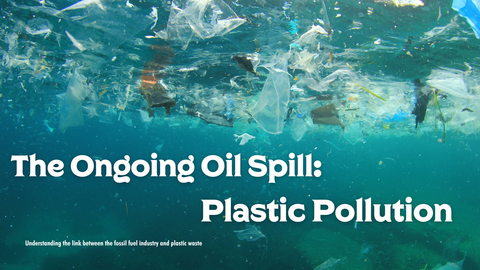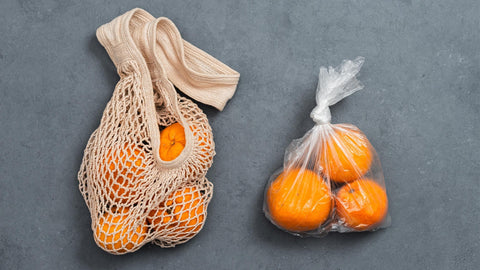
By Farah Stack
Plastics have become essential components of products and packaging because they are durable, lightweight, and cheap. But the hidden costs of plastics significantly outweigh their benefits.
Did you know that plastics come from fossil fuels?
According to the Center for International Environmental Law, over 99% of plastic is made from chemicals sourced from fossil fuels.
That means that the climate crisis and plastic consumption are intimately linked. The more plastic used and produced by corporations, the more oil drilling and fossil fuel consumption.
Here are some reasons why we don’t like that:
- The fossil fuel industry has enacted an enormous toll on our planet, from air and water pollution to global warming. Fossil fuel activities are destroying our landscapes and ecosystems, leaving animals suffering and without homes.
- Coal, oil, and gas development pose threats to our waterways and groundwater. Coal mining operations, oil spills and leaks, and fracking release toxic chemicals into our streams, rivers, lakes, and estuaries, contaminating our groundwater sources with pollutants linked to asthma, cancer, cardiovascular disease, birth defects, and more.
- Fossil fuels emit harmful pollutants into the atmosphere long before they are burned. People throughout the United States are exposed daily to toxic air pollution.
The fossil fuel industry continues to stand idly by while endangering all of us, and especially frontline communities who lack the resources and tools to protect themselves or their families.
Even the waste management of plastics has adverse effects on people and community health. Most packaging is meant for single use, so there is a quick turnaround to disposal. Plastic packaging can be processed in three different ways: landfill, recycling, or incineration.
But, there are problems with these limited options.
Incineration facilities are a massive environmental injustice around the world and are disproportionately built near communities of color and low-income populations. Burning waste can also release thousands of pollutants into the atmosphere that are associated with severe health issues.
Landfill is not a real solution to our plastic waste problem. Landfills in the U.S. alone released an estimated 114.5 million metric tons of carbon dioxide equivalent (MMTCO2e) of methane into the atmosphere in 2019.
This represents 17.4 percent of the total U.S. anthropogenic methane emissions across all sectors!
The popular perception that plastics are easily recyclable has been shaped by decades of carefully calculated messaging designed and paid for by the petroleum and chemical industries that profit off of plastic.
Recycling was a strategy for the plastics industry to fend off plastic bans and keep its sales growing. It was never a solution to address the problem of plastic waste.
For years, the U.S. and many other Western countries have transferred the responsibility of waste management to other countries, by sending our contaminated waste to China.
In 2018, when China closed its doors to our contaminated recycling, the U.S. began sending our waste to other countries like Thailand, Kenya, Vietnam, and Malaysia. But some of these countries have started to turn down Western waste too.
There is so much plastic, especially single-use plastic, being produced, consumed, and disposed of, that we cannot recycle our way out of it. The U.S. and other Western countries must address this problem at the source which means doing whatever we can to phase out fossil fuels.
Here are 3 ways you can be of use to change our reliance on fossil fuels:
1. CALL YOUR REPRESENTATIVES!
Calling your representatives is one of the most effective ways to take action on the climate crisis and to accelerate the transition from fossil fuels to clean energy resources. Political leaders are waking up to the urgency of the climate crisis, but change is not happening quickly enough. Leaders need to hear that the health of our planet and a fossil-fuel free future is a priority for you, from you! Find out who represents you and contact them. Find your Senators and Congressman and woman here.
2. ELECT CLIMATE LEADERS!
We are two years into the decisive decade to act on climate change. We have the tools, the plans, and the strategies to act on humanity’s greatest problem, but we lack climate leadership. We must drive down dangerous greenhouse gas emissions before our looming tipping point in 2030.
The fossil fuel industry’s influence in U.S. politics is repulsive. For decades, fossil fuel and petrochemical industries have attempted to influence and stifle the United State’s actions on climate policies at the federal and state level. There are FAR too many politicians corrupted by the greed and profit of coal and dirty oil and they MUST be replaced with climate-conscious leaders.
Research which political candidates at local, regional, state, and federal levels have the best climate proposals. Always remember, local elections matter! And VOTE!
You can also volunteer with the Environmental Voter Project to help grab political power and get more people to act on climate! No experience is required!
3. RAISE CLIMATE AWARENESS!
Every time a climate-related disaster happens it will only get worse and worse until we completely end our reliance on fossil fuels. And the longer we run on fossil fuels, the more plastic ends up in our oceans, soils, plants, food, and our own bodies. We must do everything we can to prevent that from happening!
Each and everyone of us has a unique set of skills, resources, and talents that can be used in the effort to address the climate and plastic crisis.
Embrace the opportunity to make change within your own community. Initiate conversations with friends and family members and encourage them to do the same. Get creative and think of alternatives to plastic. Cultivate a climate squad. Volunteer, apply for a job, enact and make changes within your own business or company. Walk the walk, talk the talk, fight the good fight.

About Pulp Pantry
Pulp Pantry turns overlooked resources like upcycled vegetable juice pulp into wholesome everyday snacks that make it convenient and delicious to eat more servings of vegetables and fiber. Pair them with dips, top them on your salad, or dig in as an afternoon snack. A delicious, satisfying, crunchy, nutritious snack for every day (hello extra veggies, and fiber).
With 5g fiber & prebiotics in each serving, Pulp Chips the best go-to snack to satisfy cravings and hunger.
Try all four of our delicious flavors: Barbecue, Salt n' Vinegar, Jalapeño Lime, Sea Salt.
Haven't tried yet? Grab a coupon to try all of our delicious flavors now.





